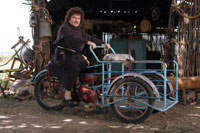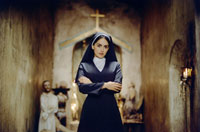There’s a pretty simple test as to whether you’d enjoy Nacho Libre or not. Two questions: Did you like Napoleon Dynamite? Do you typically like Jack Black?
If the answer to either question is no, than you can safely pass on Nacho. But if you appreciate the random quirkiness of Napoleon and the zany, melodramatic and overacted comedy of Black, welcome to a comedic goldmine. From the writers of Napoleon (Jared & Jerusha Hess) and School of Rock (Mike White) and the director of Napoleon (Jared Hess), this goofy comedy is much more like that Idaho-based surprise hit in tone and feel than the commercials let on. And while the irreverent wrestling comedy is laugh-out-loud funny and humorously surprising several times, it could have used more of Napoleon’s simple likeability and School of Rock‘s heart.

The film’s best parts come from Black’s earnest delivery and the traits it shares with Napoleon, like its look and cinematography (even though set in Mexico and not Idaho) and reliance on strange but fitting music. And like Dynamite, this film has plenty of well-delivered and fun-to-repeat one-liners that will be quoted again and again—lines like, “Beneath a man … is his nucleus.” Jokes score by relying on wry observation, small details, slow pacing, and simplicity. And perhaps the Hesses’ greatest strength is their fascination with the mundane, awkward and bizarre realness of life. Strange-looking characters don’t always know what to say and either stare with hilarious facial expressions or nervously stumble through sentences like, “Anyways, I thought you’d like to join me in my quarters this night … for some toast.”
Watching (and hearing) two awkward and teen-like adults sitting in a tiny room loudly crunching on very hard toast is enduring and fun in its simplicity and normalness. And like Napoleon, Nacho‘s best laughers come in understated and random vignettes like this. But the good news for people who criticized Napoleon for only being random vignettes and no plot, Nacho strings its comedic centerpieces on a bit more of a substantial story.

Nacho (played by Black) is a friar at the Mexican orphanage where he grew up. He loves the children, but he feels the other friars disrespect him—giving him lower duties like cooking the meals for the children but without decent ingredients. So, as he slaves over pots of sludge, he dreams of being a famous wrestler in Lucha Libre, a type of free-style fighting in Mexico. When a new—and attractive—nun (Ana de la Reguera) is transferred to the orphanage, Nacho, a slave to his menial tasks and pathetic way of life, aims to catch her eye—yes, in a romantic way. He longs for the kind of attention the great luchador Ramses (Cesar Gonzalez) gets.
Humiliated for the last time by the friars, Nacho decides to make his dreams come true. He talks a street beggar (Hector Jiménez) into becoming his sidekick. And together, they began their secret wrestling career. Before he knows it, Nacho is sucked into a selfish quest for fame and respect that leads him to materialism and neglect of the children. When given one last chance as a luchador, Nacho must battle Ramses, reveal his secret passion, and find a motivation greater than selfish rewards.
Where Nacho can go down for the count is that it doesn’t always trust its great understated and bizarre humor, but instead goes for easy laughs with broader, and borderline-crude, attempts (like many fart jokes). The result is a great mishmash of comedy styles. While the Hesses’ first outing—Dynamite—seemed innocent and sweet, there’s a touch of darkness to the humor here, including distastefully rude humor like an obese woman who crawls around like a rodent in tunnels. Yah, tunnels. (Nope, seeing the movie won’t help you understand that bit any more than right now—it’s just too bizarre to actually be funny.)

These less interesting and too bizarre side plots make the last half of the movie drag. And though the movie has a plot, the Hess knack for random vignettes leads to storylines or characters that seem like they will build to something—but don’t. So why should we care? The second half seems disjointed, the narrative unravels and the story starts to serve the joke instead of the other way around. There’s really no clear motivation for what characters do, and promising plotlines are rarely fully realized. This is most evident in the way the movie handles Nacho’s religion.
Written by the Hess couple, both Mormons, the film mentions faith often—and in some really perceptive and well-executed ways. Nacho talks about knowing the gospel and sharing it with others, and there’s a good theme of realizing you must use your desires and abilities (even if it is to wrestle in Spandex) for God’s purposes—and not for self. “If you fight for others’ well-being,” the nun tells Nacho, “only then will God bless you in battle.” And there’re some great jokes that believers will enjoy about conversion and legalism.
However, the film’s lack of character development and loose plot lead to some faith weirdness and contradiction. Nacho really doesn’t know what he believes. He has no conviction. Why is he even a friar? It’s clear that he would surrender his vows of celibacy if the attractive nun would too (he even sings a song about it). Nacho spouts not-so-good theology like “maybe we’ll meet in the next life” and consults a gypsy for help. Some faith issues just don’t add up. One minute, Nacho’s sidekick “only believes in science” and then, he’s suddenly leading Nacho in prayer.
But, let’s be honest: Fully realized plots and stirring themes aren’t what we’re watching Nacho Libre for. Though it would have been a tighter comedy by dropping about 10 minutes of the extraneous too-weird stuff and adding more interesting supporting characters, it is often very funny and will live on in many a DVD collection. After all, this is all about Jack Black being Jack Black (but with an outrageous Antonio Banderas accent), funny and well-conceived wrestling action, and catch-you-off-guard comedy. And Nacho Libre has all of those things in a headlock.
Talk About It
Discussion starters- What do you think happens between Nacho and Sister Encarnacion after the film ends? Do they get together? Why or why not? What do you think of the film toying with the idea of the celibate friars admiring and even pursuing an attractive nun?
- What’s your opinion of Nacho’s faith? Is it real and active? Why or why not? Why do you think he became a friar?
- Nacho tells Esqueleto, “I’m a little concerned about your salvation and stuff.” How do Nacho’s awkward and over-ambitious evangelism techniques mirror some of the bad strategies and horror stories you’ve seen in sharing the gospel?
- What passions and abilities do you think you’ve been given to use for God? And God use any skills and desires for his work—even fighting? Why or why not?
The Family Corner
For parents to considerRated PG, the film is mostly clean. There’s no language worse than “buttload” and “crap.” But the rough action and crude humor include fart jokes and lots of WWE-caliber wrestling sequences with chair hitting, groin shots, hair-pulling, diving into the crowd, etc. There’s a scene of a man with corn-on-the-cob (yes, really) plunged into his eye.
Photos © Copyright Paramount Pictures
Copyright © 2006 Christianity Today. Click for reprint information.
What Other Critics Are Saying
compiled by Jeffrey Overstreetfrom Film Forum, 06/22/06 From now on, whenever I eat nachos, I’ll think of Jack Black in tights. And that’s really disturbing.
Perhaps that was part of the strategy for making the new comedy Nacho Libre an enduring phenomenon. Hey, it worked for director Jared Hess before. Who eats tater tots anymore without quoting Napoleon Dynamite?
In Nacho Libre, Jack Black plays Nacho, a young man raised in a Mexican monastery in Oaxaca, who moves on from his job as a cook to try and save the monastery from financial disaster. His method for raising the funds? He’ll compete in the local Lucha Libre tournament, wrestling for prize money. Along the way, he’ll try to help the beautiful nun who wins his heart (Ana de la Reguera), and the orphans living at the monastery.
Everyone’s asking: Has Hess recaptured the quirkiness and fun that made Napoleon Dynamite such a hit?
According to Christian film critics: Close, but not quite.
Christa Banister (Crosswalk) admits that she was skeptical, but she comes out of the movie cheering. “Nacho Libre is surprisingly clean family entertainment that both kids and adults will enjoy. While the humor is certainly more juvenile than sophisticated in nature, viewers of any age can’t help but root for this unlikely hero, stretchy pants and all.”
Harry Forbes (Catholic News Service) calls it an “infantile and dull comedy” that is “utterly lacking in charm, wit or taste. Beyond the pervasive crude humor, the puppy-love relationship of its protagonists, both in religious orders—regardless of whether they’ve taken ‘final vows’—precludes recommendation.”
Tom Neven (Plugged In) says the it’s “wildly uneven, not sure what kind of movie it wants to be.” Comparing it to Napoleon Dynamite, Neven says that with Nacho, moviegoers “won’t get a goofy but mostly harmless nerd; they’ll get extreme, imitative violence that’s all the more problematic because the wrestling moves, performed here by professional stuntmen, give no indication of how truly dangerous they are. Throw in Johnny Knoxville-style stupidity, some gratuitous gross-out gags and gentle but still icky sexual tension between a friar and a nun, and it becomes painfully obvious that this Nacho is no tater tot.”
Mainstream critics are not so nuts about Nacho.











